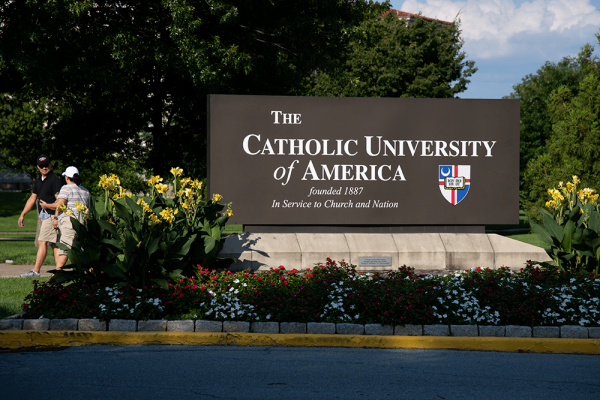Faith communities can play a powerful role in preventing violence and supporting survivors, but collectively we’re falling short. Two-thirds (65 percent) of pastors say they speak once a year or less about sexual and domestic violence, with 1 in 10 never addressing it at all.
This failure has a deep and lasting impact. A few years ago, I (Emily) was staffing the We Will Speak Out U.S. booth in a crowded vendor tent at CreationFest, the nation’s largest Christian music festival, asking passersby to sign a pledge to speak out against sexual and gender-based violence. I was disheartened by how many people, including pastors, assured me this wasn’t an issue among people of faith. Then a woman slipped through the crowd and quickly thrust a $10 bill into my hand. Our eyes barely met before she darted back into the throng. She never said a word, but her silence, and what I knew was a courageous act of support, still echoes in my mind: There is so much pain. We must do better.
This October, We Will Speak Out U.S., a coalition uniting faith communities against sexual and gender-based violence, encourages faith leaders to take a stand and speak out against domestic violence. We have assembled training resources and materials to help faith leaders take informed and appropriate action against violence — including sermon guides and litanies, basic facts about violence, links to local counseling and support allies, and more.
Below, read the open letter from faith leaders and share with others.
Dear Faith Leaders everywhere,
This is an invitation to stand with the one in three American women who have experienced intimate partner violence in the U.S. We encourage all faith leaders to participate in Speak Out Sabbath this Domestic Violence Awareness Month. From Oct. 13-15, We Will Speak Out and Sojourners are asking you to commit to speaking out against this violence from within the walls of your houses of worship.
Churches, synagogues, mosques, and temples should all be places of refuge for survivors of violence. But how can the survivors who attend our services know they are safe if we never denounce the violence from the pulpit or state clearly that our doors are always open for healing pastoral care?
An overwhelming majority of faith leaders (74 percent) underestimate the level of sexual and domestic violence experienced by members of their congregations. It is both naïve and irresponsible to believe that members of your congregation are immune from this violence. We know people of faith believe in the sacred worth of women — let's make that extra clear this October.
Here are a few tangible ways to show solidarity and support for survivors during your worship service:
1. Lead a reflection.
We risk the lives of parishioners and community members when we decide that intimate partner violence is someone else’s dirty laundry and not a health crisis and spiritual tragedy. Thirty-three percent of women will experience intimate partner violence in their lives, yet 95 percent of church-going women report they have never heard a specific message on abuse preached from the pulpit of their church. Those numbers don’t align. We recognize that for many faith leaders, Speak Out Sabbath will be the first time you talk about intimate partner violence in a sacred setting. We Will Speak Out has made this important task less daunting by providing resources for best practices.
2. Pray publicly.
The Bible — and many other sacred texts — tell stories of domestic and sexual violence. So why don’t we tell stories in our own houses of worship? And why don’t we pray aloud for an end to the violence? If Domestic Violence Awareness Month and Speak Out Sabbath fall in the middle of an already planned sermon series for your house of worship, set aside a time of prayer during your service instead, then mark your calendar so you’re ready come October 2018. Consider this prayer from Sojourners Senior Associate Editor Rose Berger:
Tender God, who gives us breath and gathers us under your wing, we come to You as a bruised and battered people. What happens to one part of the Body affects the whole Body. Open our eyes that we may see what some prefer to keep hidden from view. Teach us to shout aloud Your word of justice that we might disrupt the violence of injustice. Make us courageous to act for those who are immobilized by fear until they can act on their own behalf. Amen.
3. Connect with local professionals.
Faith leaders should always be ready to direct people experiencing abuse to emergency and professional services. Discretely place informational brochures like this one in your restrooms. But also, connect with your local counseling center and establish a plan of referral in case someone comes to you seeking professional or emergency help. It is also a good idea to have a counselor attend your worship service anytime the service revolves around domestic or sexual abuse.
4. Collect offerings and pledges.
Domestic Violence Awareness month is only one month, and Speak Out Sabbath is only one weekend within that month, but real solidarity never stops. Invite your faith community to sign the Pledge Against Violence. Collect the pledges in an offering plate alongside donations to your local shelter. Hang up the pledge in your congregation’s community hall so that survivors know that your house of worship is trying its best to also be a house of refuge, of solidarity, and of peace.
Please come to us with any questions you may have about this action. Our prayers are with you as you discern this vital request.
Sincerely,
Adventist Development and Relief Agency (ADRA)
The Rev. Amy Gopp
We Will Speak Out U.S.
Rev. Dr. Anne Marie Hunter
Director, Safe Havens Interfaith Partnership Against Domestic Violence and Elder Abuse
Sally MacNichol
Co-Executive Director, CONNECT
Kirsten Laursen Muth
Special Advisor, International Programs, Episcopal Relief & Development
Angela M. Peabody
Executive Director/Founder, Global Woman P.E.A.C.E. Foundation
Deborah Rosenbloom
Vice President of Programs & New Initiatives, Jewish Women International
Rick Santos
CEO and President, IMA World Health
Christina Tobias-Nahi
Director of Public Affairs, Islamic Relief USA
Rev. Jim Wallis
President, Sojourners
Got something to say about what you're reading? We value your feedback!








